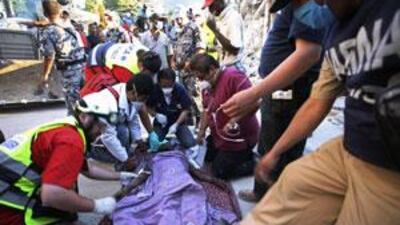The crippled port of the Haitian capital has received its first supply ship since the killer earthquake hit - a boat carrying bananas and coal that was greeted with jubilation by desperate residents of the devastated city. A swarm of small boats surrounded the ship at the entrance to the harbor late on Friday as it approached a crumbled pier with supplies from Jeremie, a Haitian town about 200 kilometers from Port-au-Prince.
Bananas will provide local residents with necessary food while coal can be used to boil water to avoid the spread of disease. But the joyful event did little to change the overall grim situation. The Haitian capital, insecure at the best of times, is now devoid of a functioning police force, bringing fears of a dystopian war of all against all in the wake of Tuesday's 7.0-magnitude earthquake. "Men suddenly appeared with machetes to steal money," said Evelyne Buino, a young beautician, describing a long, sleepless night in a neighborhood not far from the ruined city center. "This is just the beginning."
Ms Buino's immediate fear comes from a nearby prison, which contained "the worst gangsters in the city". When the earthquake unleashed its fury on Port-au-Prince's two million inhabitants, it also let loose upon them the 4,000 convicts who escaped from the city's collapsed jail. The prison's large blue iron gate remains closed, but its cell block was among the scores of buildings razed by the quake, allowing surviving prisoners to run free.
"All the bandits of the city are now on the streets," a local policeman said standing near the jail, rifle at the ready. "They are robbing people. It is a big problem." With the Haitian president Rene Preval at the airport struggling to piece together the remains of the state, desperate citizens tried to fill the void. "Organise neighborhood committees to avoid chaos," radio Metropole urged residents, "to prevent people looting shops and houses."
Patricia Etique, a Swiss citizen who divides her time between Europe and Haiti, explained the dire predicament now facing many Haitians. "People had reserves for a few days, but now they are dwindling. They are afraid to go downtown in search of food because it has become too dangerous." Kassana-Jean Chilove, a young mechanic who lost her daughter in the earthquake, expressed fury at the government.
"The government is bluffing us," she said. "There are millions of dollars pouring into Haiti but we see nothing. "At the head of the country a group of friends is divvying up the money." Before the earthquake, "we had bottled water or boiled it for ourselves," said nurse Marie-Jose Carneli, whose son Bryan-Michael began screaming from under the rubble a few hours ago. "But now we have no gas or coal and you can not sterilise it.
"I cannot buy anything because my money is stuck in the rubble of my house," she said, throwing a plastic bottle angrily at an area were pigs were scavenging for food. With the presidential palace and several other key government buildings destroyed, the Haitian government is set up in a police station close to the airport. President Preval works in an office protected by two guards from his security detail.
In another office, the prime minister Jean-Max Bellerive meets with several ministers. His original office now serves as a shelter for hundreds of families left without homes. "The government has lost its capacity to function properly, but it has not collapsed," said the president, who looked exhausted with dark pockets under the eyes. Thousands of residents have fled the city, saying they were tired of sleeping in the street, afraid of being robbed by ruthless gangs, or simply fearful of new powerful aftershocks that might destroy what buildings remain standing.
If they have relatives in the country, they gather what's left of their personal belongings and hit the road in the hope of waiting out the catastrophe in parts of Haiti that have suffered less damage. To buy one-way tickets to Fodernerg, a small city three hours away from the capital, the family of Talulum Saint Fils had to sell jewelry to come up with 400 gourdes (US$10) - twice the usual fare.
But she said leaving was worth the price. "The streets smell of death," Saint Fils said. "There is no assistance of any kind, and our children simply cannot live like animals." But thousands of others have no choice but to stay in Port-au-Prince. In the bustling Marche en Fer, or Iron Market, one of the city's poorest neighborhoods, teenage looters on Friday scuttled over the twisted concrete debris, as crowds ignored piles of dead bodies on the street in their desperate bid to dig out supplies.
*AFP

